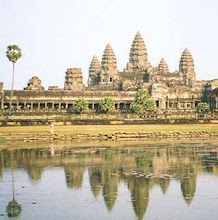Just three decades after the downfall of the Khmer Rouge, a deadly regime that left behind little notion of private property, a law that would allow foreigners to buy some kinds of real estate here appears to be nearing approval.
And while the proposed law is focused on the property market, experts agree it also would be a general boost for the country, which has been struggling through its own version of the global economic downturn.
“The law, in essence, will not help the whole economy recover. But it’s part of a wider picture,” said Daniel Parkes, country manager for the CB Richard Ellis real estate company. “What it is doing is making investment in Cambodia more transparent and easier.”
The law, which is expected to go to the National Assembly for a vote in the coming months, would allow foreigners to own apartments and condominiums on buildings’ upper floors. Now they are limited to 99-year leaseholds on any property.
Ground-level residences, which include ownership of the land that the units stand on, would continue to be reserved for Cambodians.
There are some controversial details in the draft. But over all, Mr. Parkes said, the proposed law would improve confidence in the market — especially in comparison with neighboring countries like Thailand, where foreigners are limited to 30-year leases on homes or land, and Singapore, where they are barred from owning property below the sixth floor.
Mr. Parkes’s own presence in Cambodia is due to great expectations for its real estate sector. The 27-year-old arrived here four months ago from Britain; his assignment was to open the first office of CB Richard Ellis in the capital to meet a growing demand for professional real estate services.
“Working in the U.K., it has become obvious over the last two years or so that it is a mature market,” Mr. Parkes said. “Where the future is, is in Asia.”
He says he considers the assignment to be a long-term one, and he spends weekends riding around the city on his 1967 Vespa, keeping his eyes peeled for a property that he might like to buy himself.
Over all, the country’s financial forecasts and Phnom Penh’s growth seem to support his optimism.
Economists here generally agree that Cambodia will emerge from its year-long recession in 2010. And the International Monetary Fund said in September that, while the country’s G.D.P. would contract 2.75 percent this year, it would climb about 4 percent in 2010.
The capital’s 1.3 million inhabitants mostly live in low-grade concrete apartment blocks that form the city’s low skyline. But Cambodia’s tallest building, the 30-story Canadia Tower, opened Nov. 5. And the structure, which includes apartments for some Canadia Bank employees, is the first of several such projects planned for the city center.
Like many housing markets across the world, speculative buying and inflated land values produced a lot of phantom growth in Cambodia in recent years.
From 2005 to mid-2008, prices for some houses in Phnom Penh rose tenfold. Increasing foreign investment and large-scale residential projects like Gold Tower 42, a South Korean-funded 42-story skyscraper that is still being built, were just some of the factors that led industry observers to have faith in the country’s market.
But as the effects of the global economic crisis spilled over into Cambodia in late 2008, demand dried up, and housing prices tumbled dramatically — 40 percent compared with the same period last year, according to real estate agents.
“Before there was so much investment from developers in China and South Korea,” said Soush Saroeun, executive director of Asia Real Property, a Cambodian real estate agency. He said prices in Phnom Penh’s most affluent neighborhoods had fallen to about $3,000 per square meter, or $280 a square foot, from around $4,500 per square meter in July 2008. (High-end real estate in Cambodia is generally valued in U.S. dollars.)
Some observers here say that confidence in the market actually was boosted when the long-awaited proposal to allow foreign ownership was introduced by the Ministry of Land Management in April.
Some investors and analysts say, however, that the draft contains stipulations that would cause unnecessary complications, like the rule that no more than 49 percent of a condominium building’s units may be owned by foreigners.
The rule would cause “big problems for developers in the region in their initial business plans,” forcing them to sell to two distinct markets, said Matthew Rendall, a managing partner with the legal consultancy Sciaroni & Associates, based in Phnom Penh.
Sek Sitha, an under secretary of state for the land management ministry, said the restriction was included because the government wants “Cambodians to have priority over foreigners.” But he said the Council of Ministers, which is now reviewing the draft law, and the assembly would consider the concerns.
In Channy, chief executive of Acleda Bank, one of the country’s largest banks, said that expecting Cambodians to buy 51 percent of the units in a building created to appeal to foreigners was unlikely because few would be interested in such a costly investment. “Demand is very low,” he said. “Most of our loans go to local Cambodians, but it depends on the cash flow of the individual borrower.”
The proposal also says foreigners cannot be co-owners in land purchases, nor can they buy any properties within 30 kilometers, or 18.5 miles, of the borders, except in special economic zones.
Rory Hunter, chief executive of the local property developer Brocon Group, said developers could bypass the proportional ownership issue by offering long-term leases, rather than sales, on the balance of the units in a building meant for the foreign market.
And while the current 99-year lease is not, practically, very different from an outright purchase, “psychologically, people want to own freehold, not leasehold,” Mr. Hunter said. “It will give foreign investors more confidence regarding the security of their investment.”




